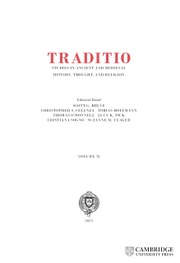East and West in the Early Middle Ages
From their crystallisation in the late fifth century to their ultimate decline in the eighth, the Merovingian kingdoms were a product of a vibrant Mediterranean society with both a cultural past and a dynamic and ongoing dialogue between the member communities. By bringing together the scholarship of historians, archaeologists, art historians, and manuscript researchers, this volume examines the Merovingian world's Mediterranean connections. The Franks' cultural horizons spanned not only the Latin-speaking world, but also the Byzantine Empire, northern Europe, Sassanid Persia, and, after the seventh century, a quickly ascendant Islamic culture. Traces of a constant movement of people and cultural artefacts through this world are ubiquitous. As simultaneous consumers, adapters, and disseminators of culture, the degree to which the Merovingian kingdoms were thought to engage with their neighbours is re-evaluated as this volume analyses written accounts, archaeological findings and artefacts to provide new perspectives on Merovingian wide-ranging relations.
- Provides a broad interdisciplinary discussion of the relations between the Merovingian world and its neighbours
- Utilises a range of methodological and disciplinary approaches featuring new fields of inquiry
- Energises scholarly debate by adopting a wide view of regional history and presenting the Merovingian world as one part in a larger Mediterranean cultural community
Reviews & endorsements
‘This edited collection of papers would be useful to both the specialist and the generalist … The nature of each chapter, and its membership of a thematic group, allows a deep dive into key historiographical issues associated with geopolitical and social interactions between East and West without having to go too far beyond the text. Indeed, the footnotes are comprehensive, providing easy access to further reading on the topics considered in each chapter. If the aim of this collection of papers is to study the Merovingian kingdoms of the early Middle Ages in a broader Mediterranean context, as the editors stipulate early in the introduction, then it would be safe to say that they have achieved what they set out to do.’ Timothy Scott, Journal of the Australian Early Medieval Association
Product details
September 2024Paperback
9781009563659
376 pages
229 × 152 × 20 mm
0.506kg
Available
Table of Contents
- List of figures
- List of contributors
- Acknowledgments
- List of abbreviations
- Introduction Stefan Esders and Yitzhak Hen
- Part I. Expanding Political Horizons:
- 1. Archaeological perspectives on communication and exchange between the Merovingians and the Eastern Mediterranean Jörg Drauschke
- 2. Anxiously looking east: Burgundian foreign policy on the eve of the Reconquest Yaniv Fox
- 3. Pax inter utramque gentem: the Merovingians, Byzantium and the history of Frankish identity Helmut Reimitz
- Part II. Patterns of Intensification – the 580s:
- 4. Cultural transmission caught in the act: Gregory of Tours and the relics of St Sergius Phillip Wynn
- 5. Hermenegild's rebellion and conversion – Merovingian and Byzantine connections Wolfram Drews
- 6. Early Byzantine church silver offered for the eternal rest of Framarich and Karilos: evidence of 'the army of heroic men' raised by Tiberius II Constantine? Benjamin Fourlas
- 7. Money for nothing? Franks, Byzantines and Lombards in the sixth and seventh century Andreas Fischer
- Part III. The Pope as a Mediterranean Player:
- 8. The Papacy and the Frankish Bishops in the sixth century Sebastian Scholz
- 9. A one-way ticket to Francia: Constantinople, Rome and northern Gaul in the mid-seventh century Charles Mériaux
- 10. The digression on Pope Martin I in the Life of Eligius of Noyon. A testimony to late seventh-century knowledge exchange between East and West? Laury Sarti
- 11. Perceptions of Rome and the papacy in late Merovingian Francia: the Cononian recension of the Liber pontificalis Rosamond McKitterick
- Part IV. Religious and Cultural Exchange:
- 12. Relocation to the West: the relic of the True Cross in Poitiers Galit Noga-Banai
- 13. A generic Mediterranean: hagiography in the early Middle Ages Jamie Kreiner
- 14. Defensor of Ligugé's Liber scintillarum and the migration of knowledge Yitzhak Hen
- 15. Willibald in the holy places Ora Limor
- Part V. Rethinking the Late Merovingians:
- 16. 'Great security prevailed in both East and West': the Merovingian kingdoms and the 6th Ecumenical Council (680/81) Stefan Esders
- 17. In the circle of the bishop of Bourges: Bern 611 and late Merovingian culture David Ganz
- 18. Contact with the Eastern Mediterranean in the late Merovingian period Ian Wood
- 19. 'Merovingian' illuminated manuscripts and their links with the eastern Mediterranean world Laurence Nees
- 20. 'Sons of Ishmael, turn back!' Ann Chrystis
- 21. Carolingian kingship, apostolic authority and imperial recognition of Pippin the Short's 'Italienpolitik' and the quest for royal legitimacy Erik Goosmann
- Index.

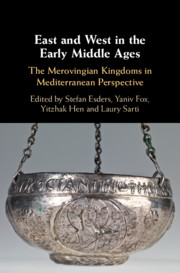
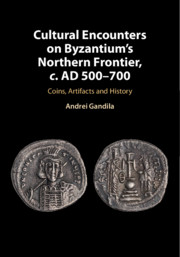
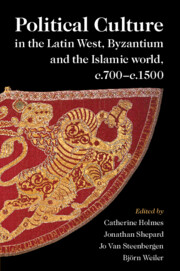
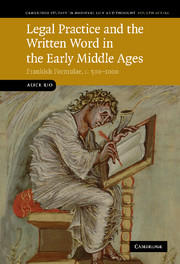


.jpg)
.jpg)
